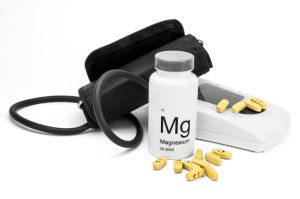
Do you and your patients enjoy watching college basketball games during March Madness every year? We do!
Perhaps this year, you could also participate in some Magnesium Madness!
What is so mad about magnesium? Well, research shows that at least 48% but up to 75% of the population does not consume enough of this crucial mineral daily.1 Madness!
Optimal magnesium intake is vitally important for bone strength, sustained energy production, insulin sensitivity, blood glucose management, and healthy blood pressure levels.1 Researchers recently conducted a meta-analysis that included over one million participants from 40 clinical studies. The researchers discovered that higher magnesium intake reduces the risk of stroke, heart failure, type II diabetes, and all-cause mortality. According to the analysis, increasing the intake of magnesium by 100mg per day could reduce the risk of all-cause mortality by 10%, stroke by 7%, type II diabetes by 19%, and heart failure by 22%.2
Optimal magnesium intake offers many benefits to the cardiovascular system, which might need extra support this time of year during exciting college basketball games!

Magnesium Madness
Magnesium is the fourth most abundant mineral in the body and is required for the optimal function of over 600 enzymes. It maintains normal cellular function, plays a role in RNA and DNA synthesis, influences calcium levels, and supports healthy antioxidant levels. Magnesium is primarily found in bones and teeth, and only 0.3% of total body magnesium is in the blood serum.3
So, measuring total or ionized magnesium levels in the blood does not always provide insight into total magnesium levels in the body, which makes it difficult to diagnose a magnesium deficiency. A deficiency is also a challenge to confirm because it can look like several other health conditions. Therefore, many of your patients probably have a magnesium deficiency but do not know.3
Signs and symptoms of magnesium deficiency can include anxiety; weakness; agitation; depression; menstrual cramps; hyperactivity; headache; migraine; irritability; hearing issues; low stress tolerance; loss of appetite; nausea; insomnia and other sleep disorders; impaired athletic performance; muscle spasms; backaches; neck pain; urinary spasms; magnesium deficiency tetany; nervousness; increased sensitivity of NMDA receptors to excitatory neurotransmitters; nystagmus; paresthesia; poor memory; seizures; tremor; vertigo; constipation; cardiac arrhythmias; hypertension; coronary spasm; decreased heart pump function; digitalis sensitivity; torsade de pointes; hypokalemia; hypocalcemia; sodium retention; hyperlipidemia; decreased glucose tolerance and altered glucose homeostasis; insulin resistance; increased risk of metabolic syndrome; disturbances of bone and vitamin D metabolism; resistance to parathyroid hormone (PTH); low circulating levels of PTH; low circulating levels of vitamin D; recurrence of calcium oxalate calculi; asthma; chronic fatigue syndrome; osteoporosis; thyroid dysfunction; and pregnancy complications, including miscarriage, premature labor, and eclampsia.4,5
So, if your patients have anxiety, insomnia, insulin resistance, fatigue, thyroid dysfunction, migraines, depression, high blood pressure, asthma, or any of the health concerns mentioned above, a magnesium deficiency might be the underlying cause of or a contributing factor to the health concern.
 Magnesium consumption, in general, has significantly decreased in the last few decades. As discussed in this interesting blog post, changes in dietary habits, removal of minerals during food processing, soil depletion, and other causes can contribute to suboptimal dietary magnesium intake.
Magnesium consumption, in general, has significantly decreased in the last few decades. As discussed in this interesting blog post, changes in dietary habits, removal of minerals during food processing, soil depletion, and other causes can contribute to suboptimal dietary magnesium intake.
In addition to a low dietary intake of magnesium-rich foods, low or suboptimal magnesium levels in the body can be caused by:
- Low intake due to:
- Alcohol dependence6
- Parenteral nutrition
- Health conditions that cause a redistribution of magnesium in the body:
- Refeeding syndrome
- Hungry bone syndrome
- Treatment of diabetic ketoacidosis
- Acute pancreatitis
- Loss of magnesium via the gastrointestinal (GI) tract due to:
- Diarrhea
- Vomiting
- Nasogastric suction
- Fistulas
- Malabsorption
- Small bowel bypass surgery
- Proton Pump Inhibitor medications (PPIs), such as omeprazole, esomeprazole, and pantoprazole
- Loss of magnesium via urination due to:
- Bartter syndrome
- Gitelman syndrome
- Familial hypomagnesemia with hypercalciuria
- Nephrocalcinosis
- Hypercalcemia
- Medications, including thiazide diuretics, aminoglycoside antibiotics, amphotericin B, cisplatin, pentamidine, tacrolimus, and cyclosporine1
- Stress and high levels of stress hormones7
- Hyperinsulinemia8

Magnesium and Hypertension
According to research, there is a significant link between magnesium status and blood pressure.
Magnesium is known to:
-
- Act as a natural calcium channel blocker
- Support healthy endothelial function
- Increase nitric oxide and prostacyclin production
- Induce direct and indirect vasodilatation (blood vessel dilation)
- Alter vascular responses to endothelin-1, angiotensin II, and catecholamines, which cause vasoconstriction and increase blood pressure
- Directly or indirectly inhibit aldosterone production to reduce the reabsorption of sodium and fluid in the kidneys9
Epidemiologic studies highlight an inverse relationship between dietary magnesium intake and the risk of hypertension. Clinical trials confirm magnesium supplementation supports healthy systolic and diastolic blood pressure in both men and women. Studies also show that gestational hypertension is related to a suboptimal dietary intake of magnesium during pregnancy.9
A thorough review article published in November 2021 suggests that optimizing dietary intake in patients with hypertension could be a clinically effective recommendation. The authors also note increasing magnesium intake by 100 mg daily is associated with a 5% reduction in the risk of developing hypertension.10
The most significant cardiovascular risk reduction occurs when magnesium intake is increased from 150 mg to 400 mg per day. Patients can achieve and maintain a healthy magnesium status by consuming foods that are high in magnesium. Whole foods that are naturally high in magnesium include almonds, bananas, black beans, broccoli, brown rice, cashews, yogurt, flaxseed, green vegetables (spinach), avocado, peanuts, oatmeal, pumpkin seeds, chia seeds, and soybeans.3,11,12

Supplementing with magnesium and taking steps to reduce the loss of magnesium from the body by managing stress, reducing alcohol intake, and supporting optimal insulin levels are additional strategies that could be considered.3
March Madness basketball games can significantly increase heart rate and blood pressure, so consider discussing the vitally important mineral magnesium with your patients this year.

To place a test order, click here. As a reminder, DiagnosTechs can drop ship test kits directly to your patients. You may select this option at the top of the order form.
Please visit our Provider Tools page for further information about test selection, test interpretation, and more!
YOU MAY ALSO ENJOY
In honor of American Heart Month, we are sharing information about the beneficial effects of bioflavonoids on your cardiovascular system. Heart disease is the number one cause of death worldwide, so consider taking better care of your heart by reading our blog and increasing your intake of heart-healthy bioflavonoids.
SYNERGISTIC NUTRIENTS FOR ADRENAL SUPPORT
We often think of supplements as vitamins and minerals that need to be taken only as needed for potential nutrient deficiencies or inadequacies. However, nutritional supplements offer much more and can manifest powerful synergistic benefits that go far beyond simply replacing the vitamins and minerals missing from your diet.
BOTANICALS TO SUPPORT A HEALTHY GUT MICROBIOME
Did you know that consuming unusual foods, eating on the go, sleep disruptions, emotional stress, schedule changes, traveling, and other factors could significantly affect the health of your gut microbiome? If you traveled or experienced increased stress during the holidays, your gut microbiome might need a tune-up for the New Year.
POSTBIOTICS – THE NATURAL ANTIVIRALS OF THE FUTURE?
Microbial medicine has significantly evolved in recent years, and we now know nourishing the microbiome is a potential treatment option and prevention strategy for many health concerns. Microbial communities are found in many areas within the human body, including the gut, skin, lungs, sinuses, mouth, and urinary tract. The gut microbiome and its metabolites, in particular, play a fundamental role in many bodily functions, including nutrient production, nutrient absorption, immune system regulation, and the defense against infections, including viral infections.
References
- Ahmed F, Mohammed A. Magnesium: The Forgotten Electrolyte-A Review on Hypomagnesemia. Med Sci (Basel). 2019;7(4):56. doi:10.3390/medsci7040056
- Fang X, Wang K, Han D, et al. Dietary magnesium intake and the risk of cardiovascular disease, type 2 diabetes, and all-cause mortality: a dose-response meta-analysis of prospective cohort studies. BMC Med. 2016;14(1):210. doi:10.1186/s12916-016-0742-z
- Razzaque MS. Magnesium: Are We Consuming Enough?. Nutrients. 2018;10(12):1863. doi:10.3390/nu10121863
- Gröber U, Werner T, Vormann J, et al. Myth or Reality-Transdermal Magnesium?. Nutrients. 2017;9(8):813. doi:10.3390/nu9080813
- de Sousa Melo SR, Dos Santos LR, da Cunha Soares T, et al. Participation of Magnesium in the Secretion and Signaling Pathways of Insulin: an Updated Review. Biol Trace Elem Res. 2022;200(8):3545-3553. doi:10.1007/s12011-021-02966-x
- Vanoni FO, Milani GP, Agostoni C, et al. Magnesium Metabolism in Chronic Alcohol-Use Disorder: Meta-Analysis and Systematic Review. Nutrients. 2021;13(6):1959. doi:10.3390/nu13061959
- Pickering G, Mazur A, Trousselard M, et al. Magnesium Status and Stress: The Vicious Circle Concept Revisited. Nutrients. 2020;12(12):3672. doi:10.3390/nu12123672
- Gommers LM, Hoenderop JG, Bindels RJ, et al. Hypomagnesemia in Type 2 Diabetes: A Vicious Circle?. Diabetes. 2016;65(1):3-13. doi:10.2337/db15-1028
- Banjanin N, Belojevic G. Relationship of dietary magnesium intake and serum magnesium with hypertension: a review. Magnes Res. 2021;34(4):166-171. doi:10.1684/mrh.2021.0492
- High blood pressure symptoms and causes. Centers for Disease Control and Prevention. https://www.cdc.gov/bloodpressure/about.htm. Published May 18, 2021. Accessed January 4, 2023.
- Samadian F, Dalili N, Jamalian A. Lifestyle Modifications to Prevent and Control Hypertension. Iran J Kidney Dis. 2016;10(5):237-263.
- Office of dietary supplements – magnesium. NIH Office of Dietary Supplements. https://ods.od.nih.gov/factsheets/Magnesium-HealthProfessional/. Published June 2, 2022. Accessed February 13, 2023.

